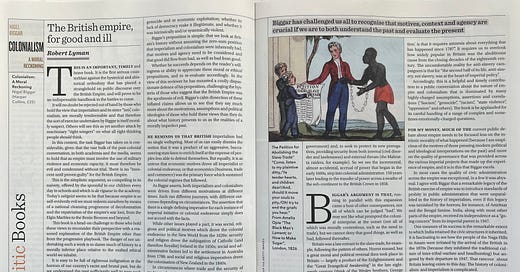Nigel Biggar and the battle for history
Hyperbole? Some people think so. A historian of empire at a well-known British university - incidentally one where I received one of my post-graduate degrees - has this week written a dismissive review of Nigel Biggar’s new book ‘Colonialism, A Moral Reckoning’ with the accusation that the history culture wars are in effect a figment of Biggar’s imagination. He denies that the overall tenor of historical evaluation of empire is ethically biased, suggesting that Biggar has created something of a strawman to advance a spurious argument that historians are subverting the study of imperial history to advance their own political agendas. But he undermines his argument by the rather bizarre assertion that authors such as Caroline Elkins ‘publish their scholarship as part of a vibrant, global set of debates that team with exciting disagreement about the history of empire.’ Anyone who has had the misfortune to read Ms Elkins book will recognise that it is hardly any of these things.
This type of assertion - that historians virtuously publish and debate on a level playing field of moral views and ethical opinions - is exactly the point of Biggar’s book and is precisely the petard upon which the reviewer I have just mentioned has been hoisted. It is very clear that the evaluation of the historical record in Britain in our universities and the media is not undertaken in a moral vacuum. Many of those who teach in the history faculties of our universities present a view of history that aligns closely to their political ideology, not necessarily to the historical facts as they present themselves, nor of the context (moral or otherwise) in which those facts were apparent. Biggar does a very good job in fact of presenting the reality of the British Empire within the moral context of the time, one that in fact compares pretty favourably with modern moral and ethical principles. The whole debate about slavery is one example of many. A dramatic sea-change in British opinion moved decisively against slavery in the late C18th and, despite the country’s earlier laissez-faire acceptance of the practice, subsequently fought tooth and nail, and at great cost, to eradicate this scourge where and whenever it could. Indeed, the history of the Royal Navy in the first three-quarters of the C19th was as moral crusader par excellence. Its the discussion about this dramatic change in direction and the strident political and moral objection to slavery that those who claim that modern Britain is the legatee of slavery ignore, for their own political ends. And its this debate that Biggar helpfully unravels, despite the tortuous denials of the reviewer I mentioned above who perversely asserts that in Biggar’s ‘effort to tell a moral story leads him to ignore large-scale processes that cannot be justified in present-day moral terms.’ Nonsense. Biggar’s book is a masterclass in doing precisely this.
Anyway, for what it is worth, my review in the March 2023 edition of the excellent The Critic magazine is out now. I’ve attached it here, but would encourage you to subscribe if you are able.




